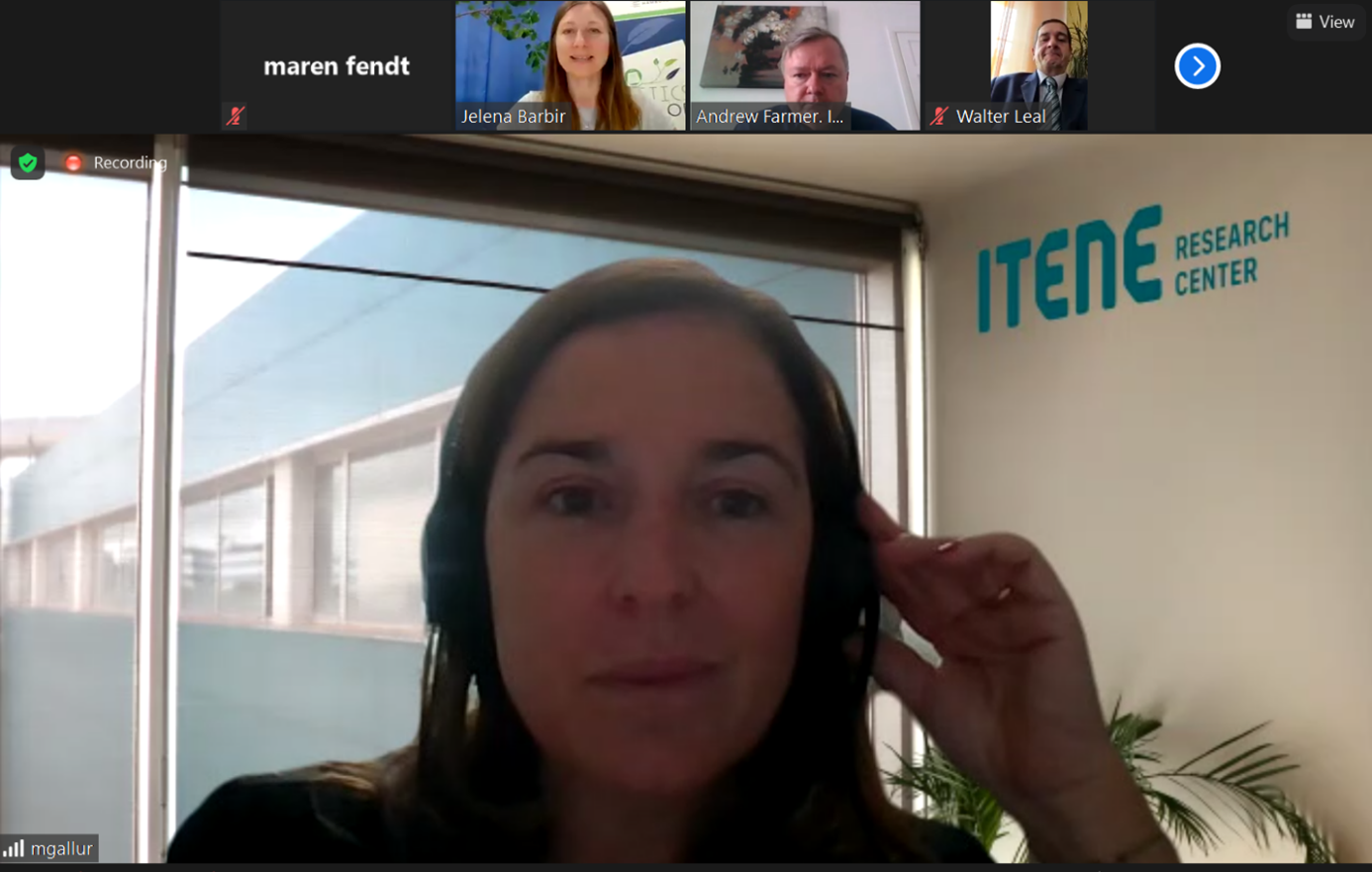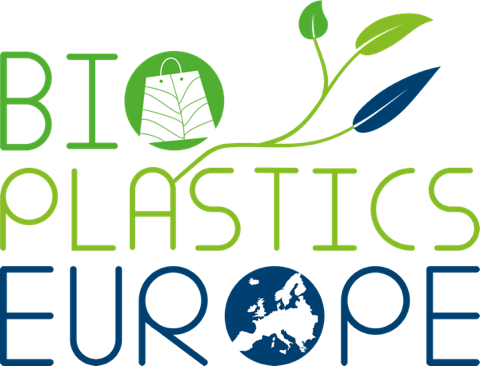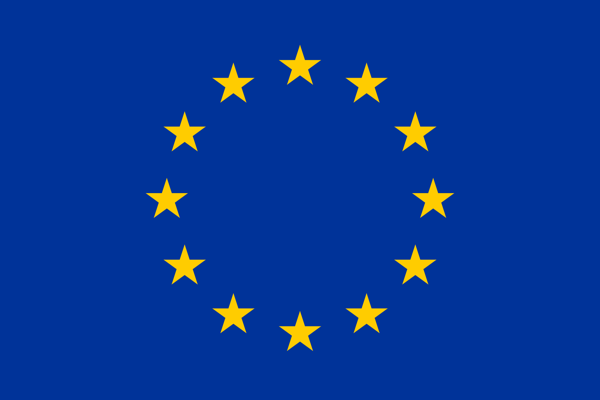The quest for bio-based plastics: two EU research projects cooperate
Hamburg, 07 July 2021 - Since 01 July 2021, many single-use plastic products have been banned in the EU. Science believes this measure will make a major positive contribution against plastic waste in the sea. The EU is taking a further step with two research projects that are looking for alternatives to plastics - and should enable the definition of clear criteria for its biodegradability. Now the two European projects BIO-PLASTICS EUROPE, coordinated by the University of Applied Sciences (HAW) based in Hamburg/Germany, and SEALIVE, coordinated by the Instituto Tecnológico del Embalaje, Transporte y Logística (ITENE) in Valencia/Spain, have met online with EU representatives to engage in a knowledge exchange.

Pictured: Dr. Miriam Gallur, of SEALIVE, presenting her views on the challenges to be overcome in bio-based plastics research
The topic of "Opportunities and limits of EU policy for biobased and biodegradable plastics" was the subject of an online event organized by the two EU-funded projects at the end of June. The event was attended by Dr. Silvia Maltagliati, Policy Officer of the European Commission's Directorate General for Research & Innovation, as well as approximately 75 participants from all over Europe and the two projects.
Maltagliati provided insights into the EU research and innovation policy, referring to the definition of bio-based plastics in the EN 16575 standard and emphasizing the European Commission's interest in promoting biodegradable plastics. She pointed out the need to develop a regulatory framework that sets clear and precise criteria for defining biodegradability and compostability. Referring to the EU Plastics Strategy 2018, she underlined the EU's ambition to change the plastics economy in a sustainable way: "Single-use plastic products should not be produced, instead we aim for a circular economy."
Prof. Walter Leal, BIO-PLASTICS EUROPE Coordinator at HAW in Hamburg, presented the five bio-based plastic prototypes that have been developed so far in the project and are now being tested by different project partners. He also reported on the status of the safety protocol for bio-based plastic products, which aims to ensure the safe use and end-of-life management of bio-based and biodegradable plastics. According to Leal, "This is a very concrete way to help in the fight against plastic pollution."
The benefits of the circular economy and the difficulties that need to be overcome along the way were explained by Dr. Miriam Gallur, SEALIVE coordinator at ITENE in Valencia: "It is important to define the biodegradability aspect precisely to ultimately enable consumers to make more sustainable choices." Dr. Andrew Farmer, SEALIVE member at the Institute for European Environmental Policy in Brussels, stressed the need for consumer information to be presented in an understandable way, which is problematic: "Recyclability and compostability are very complex and ultimately dependent on local waste management systems." Jill Adams of the Prospex Institute in Brussels, a member of BIO-PLASTICS EUROPE, explained how stakeholders ranging from consumer organizations and environmental NGOs to municipalities and waste management companies, as well as packaging and consumer goods manufacturers, are involved in ongoing projects: "We organize regular workshops where representatives from the entire bio-based value chain are informed on the state of research and give their assessments and input."
The European research projects BIO-PLASTICS EUROPE and SEALIVE have been cooperating since April 2021 to exploit synergies for the production and use of bio-based plastics. Both projects are developing sustainability strategies and solutions for bio-based products and thus support the EU plastics strategy. Their aim is to explore closed-loop technologies and end-of-life solutions to develop sustainable bio-based plastics which reduce waste and pollution on land and in the oceans.
In a follow-up event later this year, both projects will inform EU decision-makers and interested stakeholders on their latest research results. Until then, interested parties can read the latest research status on the websites of BIO-PLASTICS EUROPE bioplasticseurope.eu and SEALIVE sealive.eu/about.
About the projects
BIO-PLASTICS EUROPE has been working on the development of sustainable solutions for the production and use of bio-based plastics with 22 project partners from 13 countries since its launch in October 2019. Until now, eleven research papers have already been published, five prototypes of bio-based plastics have been developed, and work has begun on a safety protocol to ensure the safe use and end-of-life management of bio-based and biodegradable plastics. Currently, these prototypes are being tested in the laboratory and in field trials. Initial results are expected by the end of the year and will be used to evaluate the safety of using the new materials in applications such as reusable cutlery, toys, soft and rigid packaging, agricultural mulch films, fishing bait and fishing crates. The goal of the project is to provide bio-based, biodegradable, sustainable and safe materials for the manufacturing of these products.
SEALIVE (Strategies of circular Economy and Advanced bio-based solutions to keep our Lands and seas alIVE from plastics contamination) was launched in October 2019. The project brings together 24 partners and five affiliated organizations from eleven countries in Europe and South America from the fields of applied research, industry and non-governmental organizations that have made their mark in the plastics, recycling and biopolymers sectors. SEALIVE aims to promote the use of biomaterials and bring to market innovative bio-based plastics that offer viable alternatives to conventional products. To this end, eight bio-based plastics are being further developed and tested in six regions where land and water are heavily polluted by plastic waste. Currently, SEALIVE partners are studying products such as single-use plastics, agricultural mulch films and traditional fishing nets to develop bio-based versions for them.
Contact
BIO-PLASTICS EUROPE
Hamburg University of Applied Sciences (HAW)
Research and Transfer Centre „Sustainability and Climate Change Management“
Ulmenliet 20
21033 Hamburg, Germany
bioplasticseurope.eu
Project coordinator: Prof. Walter Leal, HAW
walter.leal2@haw-hamburg.de
Communications: Cintia Nunes, HAW
cintia.nunes@ls.haw-hamburg.de
SEALIVE
Instituto Tecnologico del Embalaje, Transporte y Logistica (ITENE)
Parque Tecnologico
C/ Albert Einstein, 1
46980 Paterna, Valencia, Spain
www.sealive.eu
Project coordinator: Miriam Gallur, ITENE
miriam.gallur@itene.com
Communications: Annette Wilson, ERINN Innovation
annette@erinn.eu


